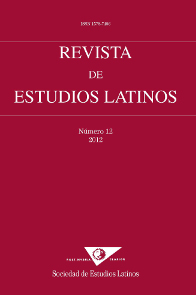Jodoco Badio Ascensio y sus sentimientos enfrentados hacia Villadei. Una lectura alternativa
DOI:
https://doi.org/10.23808/rel.v12i0.87791Palabras clave:
Jodoco Badio Ascensio; Alexandre Villadei; prefacio; Edad Media; Humanismo.Resumen
Jodoco Badio Ascensio muestra una postura ambivalente frente a Alexandre Villadei en los prefacios a seis de sus once ediciones del Doctrinal. La explicación ofrecida hasta el momento ha sido que lo hacía guiado por motivos empresariales. En este trabajo se ofrece, a través de una lectura intratextual de sus prefacios, una explicación alternativa.
Descargas
Los datos de descargas todavía no están disponibles.
Descargas
Publicado
12-12-2012
Cómo citar
Martínez Sobrino, A. (2012) «Jodoco Badio Ascensio y sus sentimientos enfrentados hacia Villadei. Una lectura alternativa», Revista de Estudios Latinos, 12, pp. 79–89. doi: 10.23808/rel.v12i0.87791.
Número
Sección
Artículos
Licencia
Los originales publicados en las ediciones impresa y electrónica de esta revista son propiedad de las personas autoras de los mismos y se podrán difundir y transmitir siempre que se identifique la fuente original y la autoría en cualquier reproducción total o parcial de los mismos, y siempre que no tengan una finalidad comercial.






